
 |
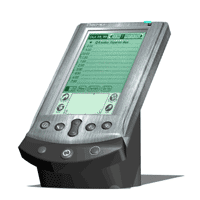
This document examines the role my hand-held computer has played in my life and why I call it 'The Oracle'. It is opinionated and flavoured on my experiences.
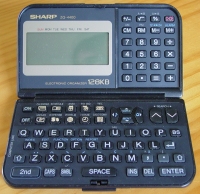 ORACLE 1
ORACLE 1I first bought an electronic organiser on the 7th of December 1994. Not telling myself what it was, I wrapped it up and put under the Christmas tree for me to open on December 25th.
The Sharp ZQ-4400 cost me $299 (a lot at that time) and I could not forsee how it would revolutionize my view of diaries. I could not afford the PC-link kit at the time, and told myself that was not important to 'sync up' with my PC as the PC (a 486SX) and the diary were to be used for completely different things. I resolved not to carry a pen and paper around at that time, and ditched the offered "Teachers Chronicle" thingy that year.
I had a fairly good idea what I wanted the thing to do, and after much searching, I decided on this model for a number of key reasons
This little diary went with me everywhere, and I religously entered contact details and diary data (for anyone who knows me, you would know I have no working short-term memory) and used the indexed memos to store all sorts of stuff, including my timetable, lesson plans, network config, passwords, account names, subject notes and other things that I knew I would forget otherwise. As I came across an interesting or important bit of info, in I would key it, store it in a category that made retrieval later obvious.
I consciously did not carry pens and pencils with me - this forced me to reach for the Oracle naturally when I wanted to take notes or check something. It was a lifestyle choice that I shaped to suit me and, although it was not the ideal tool for some jobs, it excelled at others. I have seen others take this choice half-hearted, leaving their organiser on the desk, in the bag and not taking it with them - I could not do this as I needed it a lot of the time and being lazy I was not prepared to go back to my desk to retrieve it. This training IWHO was central to the success of Oracles to come.
My decision to not buy the PC-Link kit caught up with me 2 years into the life of this little treasure when BOTH the storage battery and the backup battery conked out simultaneously. That this happened a week after the warranty ran out is neither here nor there - I should have expected it, appliances are programmed to do this. Normally one battery (one of those flying saucer shaped things that go in watches) would last over a year, but luck was not on my side the weekend both died. It was like a death in the family and everyone avoided me as I fumed, ranted and raved and threw things to make me feel better. After re-entering all the data I could remember, I dutifully used Oracle1 (replacing the batteries regularly) until it was replaced by ....
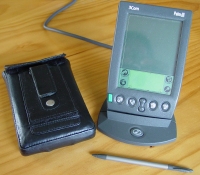 Oracle 2
Oracle 2I purchased a PalmIII in December of 1998, costing $500 (quite a lot at that time). I did not tell myself what it was and the kids eagerly wrapped it up and put it under the Christmas tree as a lovely surprise on December 25th.
I entered the palmtop era before what many would consider 'decent' hardare was affordable but decided to buy the biggest/top of the range I could get my credit-card on to at the time. I did not want a PC - I had plenty of them and the job of the Oracle has always been different to that of a computer per se.
The PalmIII came with a flip-top cover, making it look a lot like a tricorder (seamless mention of the Star Trek universe here - did I get away with it?) and it took me about 2 days to hate the flip-top cover as it shaded the display (which is not a really bright thing to do on an LCD screen). I purchased a leather belt-clip pouch thingy from Hardly Normal at a cost of $80 which at the time seemed like a lot of money to pay just for a case.
Being unable to connect my old Oracle to the brand-shiny new one, I manually re-entered all important data - a minefield but because the PalmIII came with a serial connection and sync cradle, I could at least type the info and this was faster intitially while I mastered the bastardised alphabet that was Graffiti1 (the PalmIII's built in hand-writing recognition script). Pretty soon this little plastic pal that is fun to be with went with me everywhere and up until recently continued to do so.
Interestingly, although it only came with 8Mb of storage (top of the range when it was bought), the apps were so compactly written and the data stored so efficiently that I never cracked more than ½ full in it's lifetime. This included markbooks, passwords and account details for every student, lesson notes and sequences for 4 years, birthdates and anniversaries, contact details, hierarchical 2do lists and so on... amazing really.
The PalmIII operating system is instant-on and extensible via programs and system hacks and the net is full of stuff that is installible on the handheld. In it's lifetime it went through many hundreds of different applications until I settled on a number of standard programs (clocks, calculators, graphic organisers, document readers, hack managers) and a large collection of fun stuff (games, IR remote controls, music composition tools and the like).
I soon realised that writing with a stylus on a plastic touch-sensitive screen wears tracks in it and explored screen-protectors before any noticeable damage was done. Name brand ones were 4 times the price of generic brand ones and I still use generic ones today - I usually tried to replace the screen protector each semester. The peculiar type of adhesive meant they stay put and are relatively easy to remove when needed without leaving a sticky residue.
A number of features IWHO made this handheld near perfect:
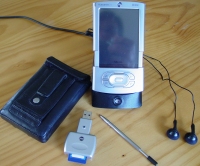 ORACLE 3
ORACLE 3I purchased a Palm Tungsten T3 in late December 2003, costing $735. I did not tell myself what it was and the kids were brow-beaten into wrapping it up and put it under the Christmas tree as a welcome surprise on December 25th.
I also purchased an MP3 expansion kit [$127 some specialised media-player software that I ended up never using, a USB card dongle and a new-fangled 30Mb SD memory expansion card] but have yet to do anything even vaguely educational with this yet [apart from being cross at the lack of space for storing music].
I am currently exploring the world of palmtop computing with this little beauty. Oracle2 donated it's leather pouch to Oracle3 and faithfully beamed all my data across. The USB hot-synch cradle also recharges the gizmo.
I feel like an old friend has departed, not carrying around Oracle2 but remember such mixed feelings at the passing of Oracle1 [both of which I still own]. Watch this space as I reflect on Oracle3, after I have used it for a while.
...6 Months Later
Many a time, people have suggested that I should have bought a PocketPC of some flavour, and strangely they do not seem to understand my reasons for disagreeing with them. I use the Oracle for different things to my laptop - complimentary but different things. That is not to say I couldn't use it thus, but by choice my Oracle has a role distinct from my PC.
I quickly learned that the protective membrane that shipped with Oracle3 was nothing more than for 'show'. It quickly stretched, distorted, bubbled and began to send the machine into apoplectic fits of activity as the screen tension triggered off applications and functions within them that I could not counterract (nor initially understand) - I had convinced myself that this one must have been a 'lemon', as in it's first week, it was hard 'reset' dozens of times. A visit to a Hardly Normal Computer Superstore and the purchase of some 'real' generic-brand screen protectors prevented me from taking Oracle3 back and demanding a replacement - well worth $19.
USB hot-synching is heaven, but at a pinch, i have hot-synched with my laptop via infa-red as well (slower but just as reliable). I do not have a blue-tooth adapterfor my laptop,so have yet to use that protocol to synch - my guess is it would work just as seamlessly. I more recently purchased a 1Gb SD card for $40, providing me with much needed music storage space.
Document Exchange (a feature on Palms, where Acrobat PDFs, Word, Excel and Powerpoint files can be 'encoded' and loaded onto Oracle3 via supplied 'launcher' applications) is brilliant - what did I do before it?
...there is an INTERLOPER (or "gateway drug" into the PHONE world, that I had previously not entered) that will be mentioned but not graced with an oracle label. My daughter needed a mobile phone, I bought 2 - little FLIP PHONES (I had a black one, she a pink one, both nicknamed "barbie phones" as they were almost hopeless for everything, including making and taking phone calls)
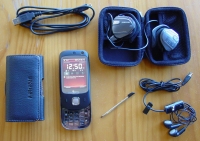 ORACLE 4
ORACLE 4 I purchased an HTC Touch Dual PDA Smartphone in mid August 2008, costing $620 [after my best "good value" quote for the thing came in at $790]. Given that it was nowhere near christmas, I told myself what it was a "because" present [in reality my T3 had recently stopped allowing me to edit notes and it's calendar started randomly deleting items and scrambling others - for someone with such a tenuous grip on linear time, this was clearly a crisis] and did not consider wrapping it up but ensured I was rested and relaxed for the un-boxing.
In addition, I purchased for $32 a 4Gb microSD card [for music] and was given a case and screen protector. research told me that the included software synchronised to MS Outlook and given that I have no intention of _ever_ installing Outlook [the most targetted program by Virus writers, and part of the worlds largest pooter virus = windows], with the help of a friend I researched and purchased a third party solution called PDASynch for USD$47 to synch up with Lotus Notes. Having trialled the included USB earbud headphones, decided to research and buy Bluetooth Headphones that also doubled as a hands-free headset, discovered the one I wanted was waaaay too expensive [over $200] and then found that exact same pair on sale for $79 - win win.
On initial investigation, the interface made sense to me - the "Touch-Flow" shell over the top of Windows Mobile [yes, I know, do not get me started] is really nice and intuitive. Having the underlying configurability of a full OS is also interesting and I am coming to terms with the plethora of other things the gizmo can now do. Core features [diary, contact and note management] are easy and the handwriting [lol, who uses a keyboard] is great and more importantly accurate, I do not even mind the predictive mode as it allows me to "opt in" to it's suggestions rather than just auto-replacing as I write. The stylus is small, but I can also use the otehr stylii I carry around with me all the time so is ok.
I would _like_ to say I am an experienced mobile phone user, but in truth that is still FAR from the case. Still, the oracle seems to make that a little easier and I have even found a ringtone that actually sounds like a phone. I wanted to just use my existing pre-paid SIMM, and it worked seamlessly, all stored contacts and preferences integrated themselves seamlessly.
It is early days yet, but I already feel like I have a new friend ... decommissioning the old one is something I am putting off ... we shall see
...a year later
This device single-handedly raised my blood pressure. Windows, well WindowsCE, is a labrynth of pain and disappointment but wait, there is more. Touch screens are all well and good, common sense would suggest you _manage_ touch when using the device as a PHONE - taking a call on this nightmare was hilarious. By putting the device up to your ear, it LAUNCHES whatever your ear touches - invariably I would have calls interrupted by a screen hungry app that was launched mid-call not understanding what my ear was trying to navigate to. Just plain dumb design. The slide open heyboard feature caused it to crash, the keys were too small for my giant hands and the tiny stylus caused increasing pain and suffering, exassipated by my developing nerve damage.
It was not all misery, it did help me realise that my pocket-pal could be used for a whole bunch of different things, so ....
I joined the apple cult, buying an iPhone 4s 16GB- $900 at the time, quite a lot and against everything I had previously said. I felt simultaneously a traitor and a hopeful cool-kid. I still have this phone, mind you it has been relegated to the job of iPod attached to my stereo but it is difficult to fault this device. After accepting I had to abandon hand-writing, the interface of the iPhone just makes sense and works.
Originally I re-used the leather pouch from Oracle 3, but later purchased a Crumpler pouch with a carribena clip - a version I still use.
Although idosynchratic and proprietary, and seemingly "hiding" it's file system, accepting that apps own their data and sensible things like easily copying files accross to it were "managed" by the behemoth that is iTunes, I still feel comfortable in this universe. sadly this device fell out of the update cycle and Apple decided to force me to buy a new device to use features of a new OS that were not offered on this platform.
Being comfortable and having a large collection of synched data, 5 years later....
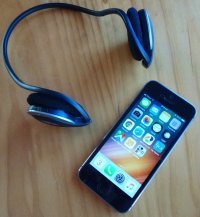 ORACLE 6
ORACLE 6I bought an iPhone 5s 64GB - it cost me over $1000 unlocked, and I still own and use this to this day, carrying it around with me everywhere. The least used "app" on this device is the "make a call" feature, but travelled with this device recently - using it as our sat nav with an overseas data sim - worked beautifully.
I am loathed to replace it but know it is coming to the end of it's support cycle, and think it is time to jump ship to the Android platform (because I can make apps for it) but ... who knows.
I still use a crumpler belt clip pouch, but it seems the days of being able to do so are limited - mobile phones are swelling, to the point that they break pockets and nudge small format tablet computers out of the way - this is not a good thing IWHO but am powerless to stop it.
I want/need a device I can easily carry, the search is becoming more and more urgent.
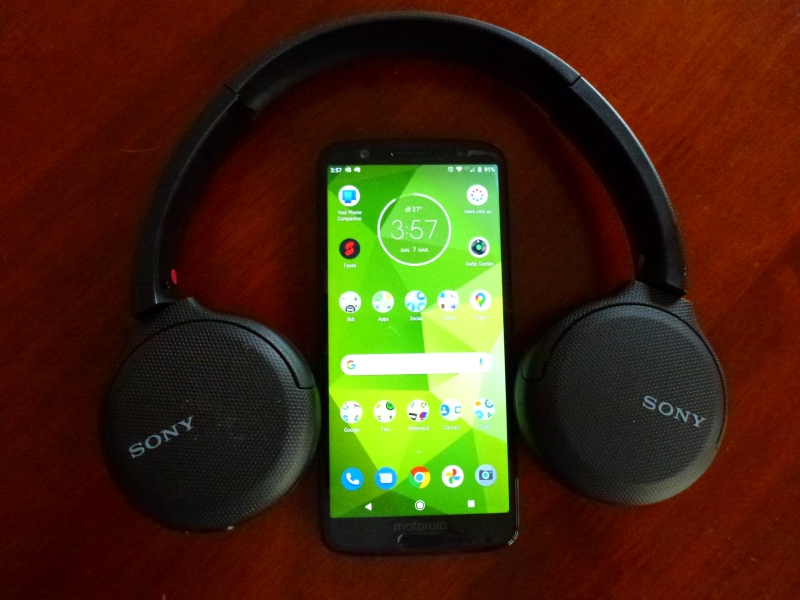 ORACLE 7
ORACLE 7I could not afford/justify the cost of upgrading my now ancient iPhone 5s, and My wife's iPhone4 was not accepting updates anymore (a "feature" that guarantees Apple planned redundance) so we decided to jump-ship - it was not a decision we took lightly because we had invested heavily in the Apple ecosystem, and sort of accepted that the apple way was the way things had to be done.
We bought matching Motorola G6's - the pair of phones cost us $600 (ie. $300 each!!!). I _wanted_ a pen-based android, but could not justify the expense of a galaxy note. I bought a belt-clip pouch online so i can carry it hands-free.
I reasoned a change in platform would require support, so decided to share the experience - we were both astonished how easy it was to make the change. The phone has everything (including the "make a call" app) and continues to astonish us at how easy it is to get it to do things.
We would be lost without it, with virtual links to our PC, simple cable access to transfer files, integration with all my Google services, gateways to Microsoft 365 work apps etc - amazing battery life and i can openly develop apps for it without having to faff around with the App store. That people still buy iPhoneys astonishes me.
Join an active online teaching community and share your opinions/concerns ...
Mail me with your ideas/feedback - I'll post it for others to see if you like.